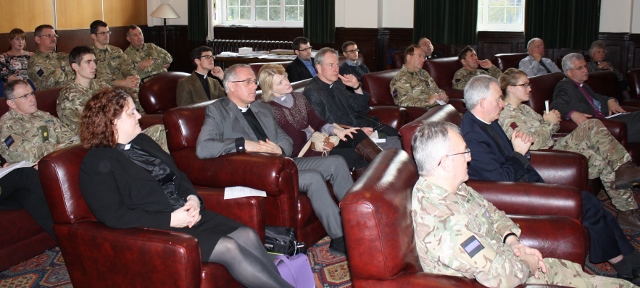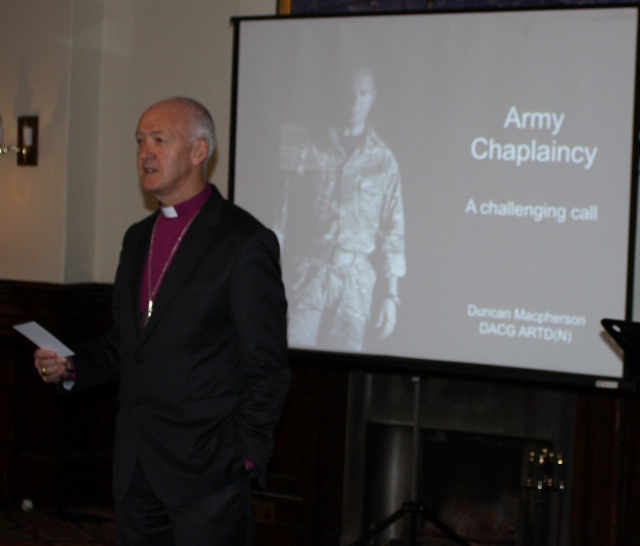 Chaplains play a vital role in the army, and Bishop Nick has been hearing about their work at Catterick Garrison during an event to encourage more clergy to consider the role.
Chaplains play a vital role in the army, and Bishop Nick has been hearing about their work at Catterick Garrison during an event to encourage more clergy to consider the role.
Catterick Garrison near Richmond is the British Army’s largest training establishment. At the Infantry Training Centre, Lieutenant Colonel Angus Philp said: “I’ve seen at first hand the value of chaplains; soldiers will readily turn to them to either pray or gain reassurance and support from someone outside their own chain of command. They make a huge difference in difficult and demanding times.”
 Army chaplains are both ordained and qualified Army officers who minister to soldiers and their families in times of war and peace. They
Army chaplains are both ordained and qualified Army officers who minister to soldiers and their families in times of war and peace. They provide spiritual support, pastoral care and moral guidance to all, irrespective of religion. They wear Army uniforms, accompany their soldiers wherever they go but don’t bear arms. They exercise leadership but don’t command.
provide spiritual support, pastoral care and moral guidance to all, irrespective of religion. They wear Army uniforms, accompany their soldiers wherever they go but don’t bear arms. They exercise leadership but don’t command.
Angus Philp added, “A lot of recruits come from difficult backgrounds and don’t have good coping mechanisms for dealing with stress. They’re trained to develop resilience, but they still need a welfare network to turn to and chaplains are an integral part of that.”
Army Chaplain, the Revd Phil Burrows, says, “We hold regular services – often in a tent during operations - as well as baptisms. Soldiers really value the reflective space - not least as a break from the stress of not knowing whether they’re going to be shot or hit an IED”.
And of, course, chaplains take funerals. Phil adds, “The repatriation of soldiers’ bodies is particularly moving - prayers are said by the coffin on the airfield before the soldier is flown home”.
Army Chaplains give moral guidance through formal teaching, personal example and counsel. They might, for example, hold discussions about the difference between what’s legally acceptable and what’s morally right.
Phil says, “It’s a great privilege to be with soldiers at some of the darkest times in their lives. When I was in parish ministry, there weren’t many opportunities for really deep conversations about faith. But soldiers are surprisingly open and they ask heartfelt questions.
“Soldiers have often been in care and told they were no good at school, so they don’t need to be told they’re not good enough – they already feel that acutely. They need to be told God loves them, and I’ve found that they really respond to God’s grace. Their eyes light up when they realise they matter to someone, and you’re sometimes able to take them one step further along the road of faith.”
 One soldier who had a conversion experience during an operation was Captain Rachel Phillips (left).
One soldier who had a conversion experience during an operation was Captain Rachel Phillips (left).
She says, “I was attending a service in a shipping container in Afghanistan and I encountered God’s undeniable love and forgiveness.” At her confirmation service she felt called to the ministry and is now exploring that call through theological training at Cranmer Hall, Durham.